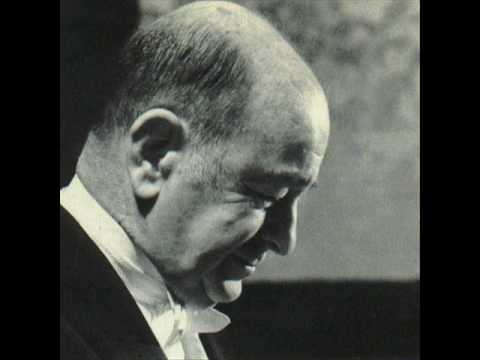Samples: Cherkassky plays Schubert Impromptu op.90 no.4

Shura Cherkassky (Odessa, 1909 – London, 1995)
Although he came from a belle époque of great piano playing, one where the cultivation of character and individuality was paramount, he could never be termed “the last of the great Romantics” for, in a sense, he represented no other tradition than his own. As he himself put it, “People tell me I am different, but . . . I just play the way I play.”
Born in Odessa in 1909 (he took two years off his age, he later admitted, to prolong his career as a child prodigy), Cherkassky left for the United States at an early age where he studied chiefly with Joseph Hofmann, that master of the inner voice, texture, harmony and rhythm. From Hofmann he learnt that even an outwardly innocent score possesses secret nooks and crannies and, once the essential groundwork was done (and Cherkassky was among the most tireless workers in the business), the possibilities were virtually unlimited. Cherkassky used this priceless legacy to supreme advantage, demonstrating in the most positive and reassuring sense that you could never fully “know” a work; that, like some multi-faceted jewel, it could be turned in the light to reveal a myriad colors and perspectives.
Acknowledgement of such enchantment was always granted by the musical cognoscenti, but wider recognition came slowly, despite irrefutable evidence of greatness provided by so many coruscating concerts and recordings. Cherkassky could be difficult and demanding, though even the most frustrated manager or producer would succumb to his capricious charm and his child- like delight in his capacity to conjure a character from everything he played entirely his own.
His repertoire was immense and far wider than his essentially romantic bias suggested. Chopin, Schumann and Liszt were complemented by Bach, Mozart, Beethoven (particularly “late” Beethoven) and Schubert; music he played, at his best, with a magisterial focus and seriousness. A tireless explorer of the modern and contemporary, he adored the opulent or refined complexities of such seminal figures as Messiaen, Boulez and Stockhausen and characteristically learnt Charles Ives’s Three Page Sonata especially for his 80th birthday recital in New York. At the same time no Cherkassky recital was complete without a trip down the byways of the repertoire, without some musical confectionery. His success, in particular, usually included such mouth-watering friandises as the Albeniz-Godowsky Tango and the Rachmaninov Polka, music he played with an irresistible élan and piquancy.
Like many of his celebrated colleagues Cherkassky found the recording studio an uncongenial setting for inspiration, for the give-and-take, the electricity of the concert hall. His audiences were invariably capacity ones, liberally peppered with pianists who shook their heads in disbelief at that extraordinary blend of charm, elfin mischievousness and transcendental pianism. Single- minded and, indeed, obsessive, Cherkassky never taught “I could never teach, not for a second, not for a moment” and successfully eluded invitations to appear on the juries of competitions, seeing them as venues of the standardization he so instinctively disliked. Bemused but delighted by so much recent fuss and attention, he reserved the word genius strictly for others, and particularly for Martha Argerich, whose virtuosity provided him with a never-ending source of fascination.
~
Source: B. Morrison, 29 December 1995
source
#Music #Success #Life #GKR #Radio #samples #producers